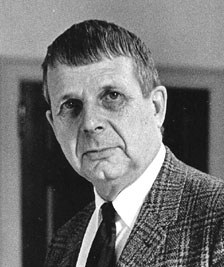Faculty of Arts and Sciences – Memorial Minute
Lars Valerian Ahlfors
At a meeting of the Faculty of Arts and Sciences on October 17, 2000, the following Minute was placed upon the records.

Lars Valerian Ahlfors was born under tragic circumstances in Helsinki on April 18, 1907: his mother died in childbirth. His father, a professor of engineering, remarried and tried to give Lars a normal boyhood as Finland struggled through World War I and gained its independence from Russia.
When he entered the university in 1924, Ahlfors soon caught the eye of Ernst Lindelof, the patriarch of Finnish mathematics, and Rolf Nevanlinna, a rising mathematical star. The year after Ahlfors graduated, Nevanlinna was invited to Zurich and Ahlfors accompanied him. There he met many of the leading mathematicians of Europe and solved an important problem in complex variable theory. Back in Finland he got a lectureship at the University of Turku, where he wrote his thesis and several other papers that attracted international attention and brought him an invitation to Harvard. The Fields Medals were first awarded in 1936, and Ahlfors was one of the two recipients.
Ahlfors came to Harvard as a junior faculty member in 1935 and stayed until 1938, when he was offered and accepted a professorship at the University of Helsinki. A pleasant year followed, but then came the war. Conditions in Finland went from miserable to tolerable and back as Finland fought two wars with Russia, so Lars was glad to accept, in the summer of 1944, the offer of a professorship at Zurich. Getting to Switzerland proved to be a major problem, however, as the war still raged to the south. Although he was still of military age, the Finnish government allowed him to leave, but he spent many months in Sweden waiting for a flight to Scotland for himself and his family. To pay for the trip he was obliged to pawn his Fields medal. They finally arrived in Zurich just as the European war was over, and Lars was able to reclaim his medal.
A year later Ahlfors came back to a professorship at Harvard. He served as chairman of the mathematics department from 1948 to 1950, and in 1964 he became the William Caspar Graustein Professor of Mathematics. He retired in 1977.
Following a long Finnish tradition, Ahlfors’ research was in classical function theory, particularly in the theory of Riemann surfaces, which offer a highly geometric approach to the study of functions of a complex variable.
A young German mathematician, Oswald Teichmuller, was killed during the war, leaving behind the beginnings of a very general theory that dealt with whole families of Riemann surfaces. At an age when most mathematicians are past their prime Ahlfors took up this theory, adding some very important geometric ideas of his own; and in a series of brilliant papers he and his friendly collaborator-competitor Lipman Bers not only laid down the foundations of his theory, but established a flourishing international school of research around it, with Ahlfors remaining the dominant figure until his retirement in 1977. Some of his students referred to him as “Mr. Complex Variable.” The global, geometric view of complex variable theory, which Alfors had championed so brilliantly through out his career, remains a center of research both in pure mathematics and in the string theory of physics.
Lars’ lectures, as well as his writings, were famous for their clarity, economy and elegance. The lectures were delivered in a strongly flavored Scandinavian accent, and his textbook, “Complex Analysis” (1953), is still the leading elementary text on the subject for students of pure mathematics. The directness of his nature is maybe best brought out by quoting from the short autobiographical remarks in the introduction to his collected works:
During 1930-1932 I made several trips to continental Europe, including a longer stay in Paris, with a grant from the Rockefeller Institute. My name was becoming known and I met many of the leading mathematicians. In 1933 I was able to return to Helsingford as adjunct professor. That same year I married Erna Lehnert, a girl from Vienna, who with her parents had settled first in Sweden and then in Finland. This was the happiest and most important event in my life.
In the department Lars was a quiet, reserved, and benevolent presence. He was always perfectly attired, attended all meetings punctually, and only now and then entered the discussion, but then often decisively. At home Lars was the warmest of hosts, a genial drinking companion, a devotee of beauty and class in every form – from literature and music to painting. All his life he was enraptured by his charming wife, Erna, whose lively temperament balanced his natural reserve. A visit to the Ahlfors’, be it in their large Winchester home or later in their Boston townhouse or their charming log cabin retreat in Maine, was always a memorable occasion.
Ahlfors was also a man of action and had an instinct for achieving his ends in the simplest way, be it in mathematics or in real life. When – already in retirement – Lars found himself accosted by a knife-wielding assailant on the doorstep of his Beacon Street apartment, he did not hesitate. He hit the chap over the head with the bottle of first-class whiskey he had just purchased, and managed to open the door to safety before the would-be robber had time to recover.
During his long and illustrious career Ahlfors received many awards, honors, and honorary degrees. Among them he especially cherished the Finish Vihuri Prize in 1968, the Wolf Prize in 1981, and his 1989 honorary degree from Harvard.
Lars’ health started to fail in the early ’90s and he died on October 11, 1996. He is survived by his wife, two daughters, and 10 grandchildren.
Respectfully submitted,
Andrew Gleason
George Mackey
Raoul Bott, Chair




